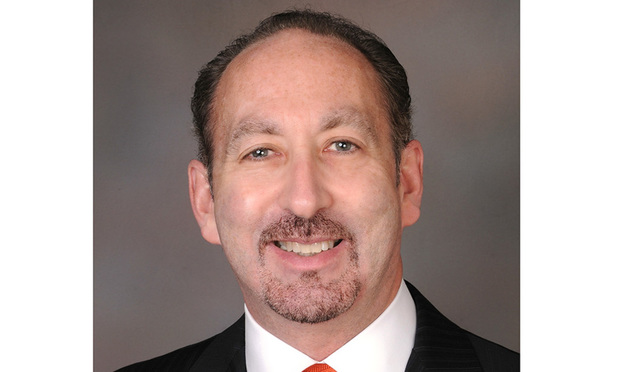Proceed With Caution: Geographic Expansion Carries Risks for NY's Midsize Law Firms
"f you have 50 lawyers spread over a dozen practice areas, it's hard to persuade clients you have the bench strength to become a powerhouse.”says Jon Lindsey, managing partner for Major, Lindsey & Africa.
April 15, 2018 at 10:00 AM
5 minute read
 Craig Brown.
Craig Brown. To hear Craig Brown tell it, midsize law firms are midsize for a reason. Their clients are local and regional. Their billing rates are lower. And truth be told, an attorney count around 100 feels just right to most of them.
So when it comes to expanding, these firms are extremely cautious. Brown, who gives presentations to gatherings of about 80 managing partners for the New York State Bar Association every quarter, says certain circumstances have to exist for midsize firms to branch out beyond their regional footprint.
“The primary reason is for their clients,” says Brown, managing principal and CEO of Bridgeline Solutions. “As clients are moving beyond local and regional, law firms are following.”
Brown says there are rare exceptions in which law firms open out-of-town offices in the absence of client demand. He cites the example of Michelman & Robinson, which has New York City offices but started in Los Angeles. The firm opened a Chicago office because it was a growing market with exceptional attorneys willing to sign on. But there weren't clients who were clamoring for it.
The 145-attorney firm also has offices in San Francisco and Orange County but the impetus for the California expansion was for the traditional reason of better serving clients, Brown said.
Meeting client needs was also what motivated Long Island firm Cullen and Dykman to more than double its attorney head count from 81 to 168 by merging with or acquiring eight firms since 2000.
“We don't go blindly into new markets unless we have a well-defined target market, typically with established loyal clients of our own,” explains managing partner Christopher Palmer.
Cullen and Dykman, which launched its practice in Brooklyn 168 years ago, opened a Garden City office in 1966 as businesses migrated to the burbs, expanded to Washington, D.C., 12 years later as clients needed help navigating regulatory matters and merged with banking and real estate firm Bleakley Platt Remsen Millham & Curran in 2003 to open a Wall Street office.
When Dewey & LeBoeuf collapsed in 2012, Cullen and Dykman hired some of its energy and utility attorneys and took over its office space in Albany. The firm eventually expanded the Albany office to include a banking and litigation practice to meet the demand for legal services in the capital and upstate.
“Many of our clients are state-specific and regional clients. They've kind of asked us to grow with them and we'll always say yes to that,” Palmer says.
Cullen and Dykman asks itself two simple questions when it considers a merger or acquisition. Will the whole be greater than the sum of the parts? Will it be a win-win for both parties? The answer to both questions must be an unequivocal yes for the firm to grow, Palmer says.
Jon Lindsey, managing partner for global recruiting firm Major, Lindsey & Africa, also suggests that midsize firms look within before expanding.
“For midsize firms, the question is do you need to be bigger,” he says. “If so, do you need to be swallowed up by one of the whales, do you need to link hands with a firm roughly the same size or can you wait long enough to do it organically?”
But he cautions: “If you have 50 lawyers spread over a dozen practice areas, it's hard to persuade clients you have the bench strength to become a powerhouse.”
Eric Seeger, a principal at Altman Weil, thinks most midsize firms are reluctant to expand.
“Midsize firms are being very careful about expansion because they have been burned so many times on lateral hires and because they are under intense pressure to meet annual profitability goals,” he says.
Murphy & McGonigle name attorney Thomas McGonigle says geographic expansion doesn't make sense unless a firm knows that opening offices will dramatically increase its client base.
The firm has offices in New York and Washington, D.C., which are necessary because its work involves the SEC. Perhaps, McGonigle says, it makes sense to open an office in Chicago because of its large financial exchanges.
But he seems to talk himself out of the idea almost as soon as he mentions it. The partners would have to be willing to put up their own money to finance expansion because the firm has decided not to take on debt. Another impediment is that it takes 120 days after hiring attorneys to bring in revenue. But perhaps more important, the partners, who have practiced together since the 1980s, like the 52-lawyer firm just the way it is.
“I can see us getting to 75 at some point,” McGonigle says. “I don't think we'll ever get to 76. We like the feel of a small place where we all know each other and can all fit in the same space.”
The same sentiment was echoed by other firms.
“What we have found is that our clients have the confidence to know that we can get the deal closed or win the case anywhere in the country,” says Richard Haddad, chair of the litigation practice at Otterbourg. “What we have found is that we don't need additional real estate. Our assets are people.”
Ronald Shechtman, managing partner at Pryor Cashman, agrees.
“Geographic expansion I think is a great challenge for midsize firms,” Shechtman says. “In the legal profession, it seems that the law of economy of scale are turned upside down. The bigger you get and the more offices you have the more expensive your operations become and the less economical they will be.”
This content has been archived. It is available through our partners, LexisNexis® and Bloomberg Law.
To view this content, please continue to their sites.
Not a Lexis Subscriber?
Subscribe Now
Not a Bloomberg Law Subscriber?
Subscribe Now
NOT FOR REPRINT
© 2025 ALM Global, LLC, All Rights Reserved. Request academic re-use from www.copyright.com. All other uses, submit a request to [email protected]. For more information visit Asset & Logo Licensing.
You Might Like
View All

'Merciless' Filing Deadline Dooms Cuban Americans' Property-Trafficking Suit Against BNP Paribas, SocGen
4 minute read
After 2024's Regulatory Tsunami, Financial Services Firms Hope Storm Clouds Break

Trending Stories
- 1States Accuse Trump of Thwarting Court's Funding Restoration Order
- 2Microsoft Becomes Latest Tech Company to Face Claims of Stealing Marketing Commissions From Influencers
- 3Coral Gables Attorney Busted for Stalking Lawyer
- 4Trump's DOJ Delays Releasing Jan. 6 FBI Agents List Under Consent Order
- 5Securities Report Says That 2024 Settlements Passed a Total of $5.2B
Who Got The Work
J. Brugh Lower of Gibbons has entered an appearance for industrial equipment supplier Devco Corporation in a pending trademark infringement lawsuit. The suit, accusing the defendant of selling knock-off Graco products, was filed Dec. 18 in New Jersey District Court by Rivkin Radler on behalf of Graco Inc. and Graco Minnesota. The case, assigned to U.S. District Judge Zahid N. Quraishi, is 3:24-cv-11294, Graco Inc. et al v. Devco Corporation.
Who Got The Work
Rebecca Maller-Stein and Kent A. Yalowitz of Arnold & Porter Kaye Scholer have entered their appearances for Hanaco Venture Capital and its executives, Lior Prosor and David Frankel, in a pending securities lawsuit. The action, filed on Dec. 24 in New York Southern District Court by Zell, Aron & Co. on behalf of Goldeneye Advisors, accuses the defendants of negligently and fraudulently managing the plaintiff's $1 million investment. The case, assigned to U.S. District Judge Vernon S. Broderick, is 1:24-cv-09918, Goldeneye Advisors, LLC v. Hanaco Venture Capital, Ltd. et al.
Who Got The Work
Attorneys from A&O Shearman has stepped in as defense counsel for Toronto-Dominion Bank and other defendants in a pending securities class action. The suit, filed Dec. 11 in New York Southern District Court by Bleichmar Fonti & Auld, accuses the defendants of concealing the bank's 'pervasive' deficiencies in regards to its compliance with the Bank Secrecy Act and the quality of its anti-money laundering controls. The case, assigned to U.S. District Judge Arun Subramanian, is 1:24-cv-09445, Gonzalez v. The Toronto-Dominion Bank et al.
Who Got The Work
Crown Castle International, a Pennsylvania company providing shared communications infrastructure, has turned to Luke D. Wolf of Gordon Rees Scully Mansukhani to fend off a pending breach-of-contract lawsuit. The court action, filed Nov. 25 in Michigan Eastern District Court by Hooper Hathaway PC on behalf of The Town Residences LLC, accuses Crown Castle of failing to transfer approximately $30,000 in utility payments from T-Mobile in breach of a roof-top lease and assignment agreement. The case, assigned to U.S. District Judge Susan K. Declercq, is 2:24-cv-13131, The Town Residences LLC v. T-Mobile US, Inc. et al.
Who Got The Work
Wilfred P. Coronato and Daniel M. Schwartz of McCarter & English have stepped in as defense counsel to Electrolux Home Products Inc. in a pending product liability lawsuit. The court action, filed Nov. 26 in New York Eastern District Court by Poulos Lopiccolo PC and Nagel Rice LLP on behalf of David Stern, alleges that the defendant's refrigerators’ drawers and shelving repeatedly break and fall apart within months after purchase. The case, assigned to U.S. District Judge Joan M. Azrack, is 2:24-cv-08204, Stern v. Electrolux Home Products, Inc.
Featured Firms
Law Offices of Gary Martin Hays & Associates, P.C.
(470) 294-1674
Law Offices of Mark E. Salomone
(857) 444-6468
Smith & Hassler
(713) 739-1250






